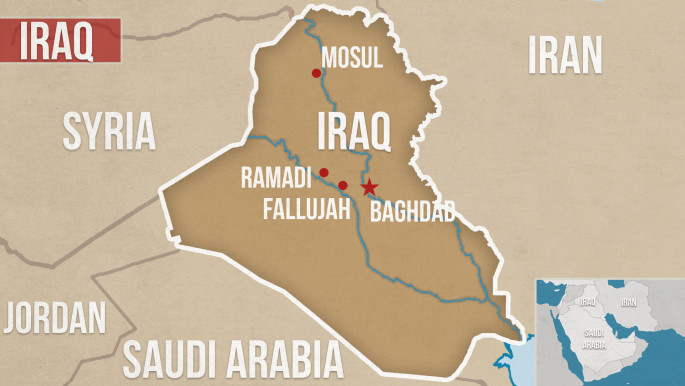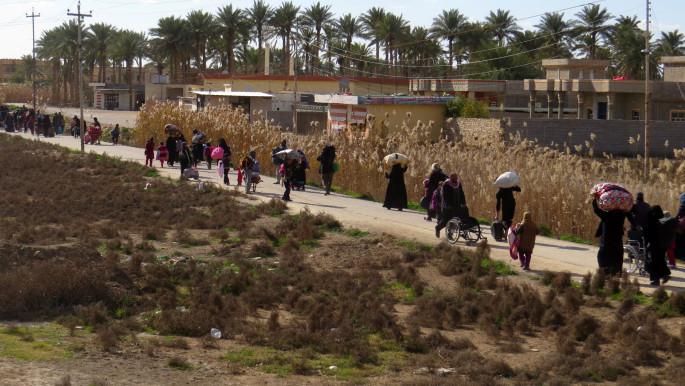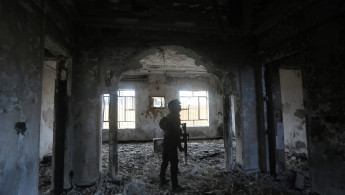Iraq's Ramadi: A picture of devastation, not of victory
A building that once housed a pool hall and ice cream shops has now been reduced to rubble. A row of money changers and motorcycle repair garages, obliterated, a giant bomb crater in its place instead.
Haji Ziad Restaurant, beloved for years by Ramadi residents for its grilled meats, completely flattened.
Once home to one million people, the Iraqi city of Ramadi is now virtually empty.
Apartment block after apartment block has been crushed and, along a residential street, the walls of homes have been shredded away.
This is what "victory" looks like: Turn in every direction and all you see is devastation.
When Iraqi government forces and their allies, backed by US-led aerial support, wrested this city from Islamic State group militants after eight months of IS control, it was heralded as a major victory. But the cost of winning Ramadi has been the city itself.
The scope of the damage is beyond any of the other Iraqi cities recaptured so far from the extremist group.
 |
|
Photographs and satellite imagery shows that more than 3,000 buildings and nearly 400 roads and bridges were damaged or destroyed between May 2015, when Ramadi fell to IS, and January 2016, after most of the fighting had ended.
Over roughly the same period, nearly 800 civilians were killed in clashes, airstrikes and public executions.
Now the few signs of life are the soldiers staffing checkpoints, newly painted and decorated with brightly coloured plastic flowers. Vehicles pick their way around craters blocking roads as the dust from thousands of crushed buildings drifts over the landscape. Along one street, the only sign that houses ever existed is a line of garden gates and clusters of fruit trees.
 |
More than 3,000 buildings and nearly 400 roads and bridges were damaged or destroyed between May 2015, when Ramadi fell to IS, and January 2016, after most of the fighting had ended |  |
The wreckage was caused by IS-laid explosives and hundreds of airstrikes by the Iraqi military and the US-led coalition.
Besides the fighting itself, the Islamic State group is increasingly using a scorched earth strategy as it loses ground in Iraq. When IS fighters withdraw, they leave an empty prize, blowing up buildings and wiring thousands of others with explosives. The bombs are so costly and time-consuming to defuse that much of recently liberated Iraq is now unliveable.
"All they leave is rubble," said Major Mohammed Hussein, whose counter-terrorism battalion was one of the first to move into Ramadi. "You can't do anything with rubble."
As a result, US-led coalition and Iraqi officials are rethinking their tactics as they battle IS to regain territory. The coalition is scaling back its airstrikes in besieged urban areas. Efforts are underway to increase training of explosive disposal teams.
The new approach is particularly key as Iraq and the coalition build up to the daunting task of retaking Mosul, Iraq's second-biggest city, held by IS for nearly two years.
"They know they can't just turn Mosul into a parking lot," said a Western diplomat in Baghdad who has been present for a number of meetings with coalition and Iraqi defence officials regarding the Mosul operation.
In January, after IS was pushed out of Ramadi, thousands of families returned to their homes. But residents have since been barred from coming back because dozens of civilians died from IS booby traps.
 |
In January, after IS was pushed out of Ramadi, thousands of families returned to their homes. But residents have since been barred from coming back because dozens of civilians died from IS booby traps |  |
Officials estimate IS planted thousands of improvised explosive devices across the city. Janus Global Operations, an American firm, began working to remove them last month and said it has so far cleared more than 1,000 square metres - a fraction of a city block.
The vast majority of the city's population remains displaced.
A high cost to 'win back' Ramadi
Ramadi lies on the Euphrates River west of Baghdad and is the capital of Iraq's Sunni heartland, Anbar province. Even as IS swept over most of the province and northern Iraq in 2014, Ramadi had held out under tenuous government control.
After months of fighting, in May 2015, Islamic State group fighters captured it by unleashing a barrage of truck and suicide bombs that overwhelmed government forces.
They raised their flag above Anbar Operations Command centre, the former provincial police and military headquarters that was once a US military base, then proceeded to largely level the complex with explosives.
 |
Over the course of the eight-month campaign to push IS out of Ramadi, coalition aircraft dropped more than 600 bombs on the city |  |
Over the following days, they methodically destroyed government buildings.
Militants took over homes, converting living rooms into command centres and bedrooms into barracks. They dug tunnels under the streets to evade airstrikes, shut down schools, looted and destroyed the homes of people associated with the local government. They set up a headquarters in the campus of Anbar University, on the city's western edge.
Over the course of the eight-month campaign to push IS out of Ramadi, coalition aircraft dropped more than 600 bombs on the city.
The strikes targeted IS fighters, but also destroyed bridges, buildings and roads, the Pentagon has acknowledged. Government forces seized districts on the outskirts and in December launched their final assault.
As Iraqi ground forces moved into Ramadi, IS methodically laid explosives and blew up swathes of the city's infrastructure. The electrical grid was almost completely destroyed and the city's water network was also heavily damaged. The militants bombed the city's remaining bridges and two dams.
Though most of the population had already left, the militants tightened checkpoints along main roads out of the city to prevent civilians from fleeing. They later used families as human shields as they made their escape.
 |
The militants tightened checkpoints along main roads out of the city to prevent civilians from fleeing. They later used families as human shields as they made their escape |  |
Ramadi residents: The biggest losers
 |
|
| Thousands of families have been displaced due to the fighting [Getty] |
Tens of thousands of Ramadi's residents live in camps or with extended family in Baghdad. Hundreds of thousands are in other nearby villages. Thousands more live in a small resort town on Habbaniyah Lake south of Ramadi that has become a sprawling camp.
Where Iraqis came to jet-ski and boat as recently as 2012, the beach is now lined with tents. The 300-room hotel and hundreds of chalets in the complex are filled with people displaced from Ramadi, Fallujah, Hit and smaller villages across Anbar.
Umm Khaled, 30, once lived with her family in a two-bedroom home in Ramadi's centre. Now pregnant with her fourth child, she lives in a small shelter on the edge of the Habbaniyah resort that her husband built with corrugated metal and plastic tarps.
 |
Where Iraqis came to jet-ski and boat as recently as 2012, the beach is now lined with tents. The 300-room hotel and hundreds of chalets in the complex are filled with people displaced from Ramadi, Fallujah, Hit and smaller villages across Anbar |  |
She said she has kept tabs on her Ramadi home since fleeing two years ago. The house remained undamaged. Then the offensive to retake the city began, and she heard from another fleeing family that her home had been hit by a missile or a bomb.
The day the city was declared liberated, Umm Khaled said the camp burst into celebration, children set off fireworks and young men danced.
Days later came more sobering news. Her husband returned to Ramadi to see what was left, and he brought back pictures on his phone.
"It was like there was nothing. And it's not just our house - the entire neighbourhood," said Umm Khaled, who did not want her full name used for feared for the safety of family members still living under IS rule.
Without a home to return to and no jobs, her family is forced to remain in the camp and is dependent on handouts from aid organisations. The little cash her family had saved was depleted months ago, making it impossible to return to Ramadi and rebuild.
According to the United Nations' satellite mapping agency, UNITAR, an estimated 5,700 buildings out of the city's total of around 55,000 were seriously damaged or destroyed.
With an eye to reducing destruction in the fight against IS moving forward, coalition planes are using fewer airstrikes and smaller, more targeted munitions.
In Hit - a small town to the west of Ramadi retaken from IS in April - Iraqi commanders complained that it was becoming increasingly difficult to get requests for airstrikes cleared by coalition forces.
Mosul is roughly two-thirds larger in area than Ramadi, and some one million to 1.5 million residents are still in the city - a far higher number than those who were in Ramadi as Iraqi forces fought to regain it - putting large numbers in harm's way when an assault is eventually launched.
 |
The day the city was declared liberated, the camp burst into celebration, children set off fireworks and young men danced |  |
The destruction of Mosul on the same scale as Ramadi would result not just in billions of dollars of damage. It also would risk further alienating the Sunni minority population.
Long oppressed under the Shia-led central government in Baghdad, some Sunnis originally welcomed IS fighters into Mosul and parts of Anbar province. But after months of increasingly brutal IS rule, the group's support among Sunnis appears to have eroded.
Widespread destruction also can spark cycles of revenge attacks within Anbar's communities, where tribal law often demands death and destruction be repaid in "blood money".
In Ramadi's eastern fringe, local security officials have already begun methodically razing homes of suspected IS sympathisers.
Hamdiya Mahmoud's family home was destroyed by IS militants. Amid the rubble that was once her son's bedroom, she points to a dresser showered with shards of plaster and concrete that was a gift to her son and his wife on their wedding day.
"I didn't let my youngest son go to school to save money to build this house," Mahmoud said, breaking into sobs. "This house is really priceless to me, it's like one of my sons."
Mahmoud said she would not seek revenge for the damage done to the property. But as her husband looked over the ruins of his house, he was less forgiving.
"I swear to God," said Ali Hussein Jassim, "if I learn who did this I will not keep silent."
With reporting by The Associated Press



